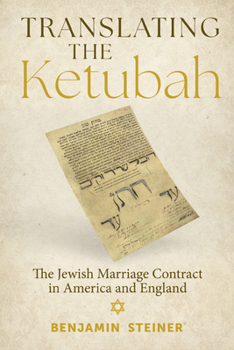Translating the Ketubah: The Jewish Marriage Contract in America and England
A groundbreaking exploration of the Jewish marriage contract and its evolution in English translation
The ketubah has been the subject of scholarly interest for a hundred years, but its translation into the vernacular from Aramaic has been completely overlooked. In Translating the Ketubah: The Jewish Marriage Contract in America and England, Benjamin Steiner explores the ketubah's translation into English as a window into Jewish history.
English translations of the ketubah illuminate the experiences of American and British Jews over a period of more than 200 years, including the relation of the law of the land to religious law and the evolving status of women within and outside Judaism. Written to elucidate regional nuances in ketubah use, Steiner's book sheds light on Jews' involvements in the economy of early New York, the institution of slavery in the antebellum South, and the world of Gold Rush California. Later chapters highlight national and international themes, including the desire of Jews in the United States and England to be both authentically Jewish and fully acculturated, and efforts by the twentieth century Conservative rabbinate to fight a perceived crisis in the Jewish family.
Ketubah translation links these disparate aims together, especially because the authorship of translations entails revealing choices from which historians can glean insights into the past. Translating the Ketubah is recommended to those interested in American Jewish and British Jewish history, women's history, religious studies, and legal history.





